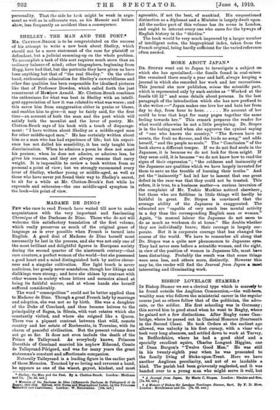SHELLEY : THE MAN AND THE POET.* ME. CLUTTON-BROCE is
to be congratulated on the success of his attempt to write a new book about Shelley, which should not be a mere statement of the case for plaintiff or defendant, but a judicial summing-up on the whole problem. To accomplish a task of this sort requires much more than an ordinary balance of mind; other biographers, beginning from Hogg, have had that, but the portraits they have given us have been anything but that of "the real Shelley." On the other hand, enthusiastic admiration for Shelley's unworldliness and other fine qualities has been responsible for idealised pictures like that of Professor Dowden, which called forth the just resentment of Matthew Arnold. Mr. Clutton-Brock combines the enthusiasm for what was best in Shelley with an intelli- gent appreciation of how it was related to what was worse ; and this saves him from exaggeration either in praise or blame, and enables him to give—it may be fairly said, for the first time—an account of both the man and the poet which will satisfy both the moralist and the lover of poetry. Mr. Clutton-Brock says of his book with a touch of disparage- ment: " I have written about Shelley as a middle-aged man for other middle-aged men." He has certainly written about him as a man who has had experience of life; but his experi- ence has not dulled his sensibility, it has only taught him discrimination. When he admires a poem he does not scant his praises; when he does not admire, or admires less, he gives his reasons, and they are always reasons that carry weight. It is impossible to review a book written from so personal a point of view; but we strongly recommend every lover of Shelley, whether young or middle-aged, as well as those who have never yet found their way to Shelley's secret, to sit for a while at Mr. Clutton-Brock's feet while he expounds and reiterates—the one middle-aged symptom in the book—his point of view.


















































 Previous page
Previous page